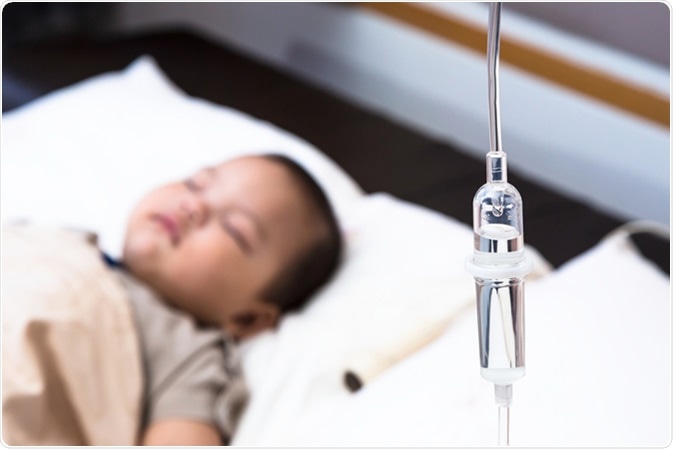Dehydration is a term which refers to the significant depletion of water in the body. It is a common condition among children and infants and accounts for a significant percentage of child morbidity and mortality worldwide. Dehydration results from decreased fluid intake or increased fluid loss. In children, these occur when they excrete body wastes in excessive amounts, exercise or engage in physical activities too intensely without adequate fluid intake, or suffer from another medical condition such as fever, diarrhea, or vomiting.
Dehydration, in itself, is a medical condition that may develop from regular activities that reduce fluid intake or facilitate fluid loss. However, it could also be a symptom of other medical conditions. Research suggests that dehydration is the most common symptom of diarrhea.
Because dehydration is common among children, various methods of diagnosis and treatment that are appropriate for younger age groups have been developed.

5 months old baby with dehydration, receiving medication through intravenous fluid therapy while asleep in hospital bed. Image Credit: Vinnstock / Shutterstock
Signs and Symptoms of Dehydration
Children with dehydration usually have observable symptoms. However, the particular signs and symptoms of the condition vary depending on its degree of severity which is determined by the degree of liquid deficit and the serum sodium levels. The severity of dehydration is usually classified as mild, moderate, and severe.
Children with mild to moderate dehydration typically show the following symptoms:
- Nausea or headache
- Dizziness or light-headedness
- Dark yellow or brown urine color
- Decreased physical activity
- Dry lips, mouth, and throat
- Urinates less frequently
Meanwhile, children with severe dehydration may have these symptoms as well as the following clinical signs:
- Excessive sleepiness
- Sunken eyes
- Discolored hands and feet
- Persistent wrinkling of the skin
- Faster heart rate
- Extreme thirst
Other medical conditions could also be risk factors for the progression of dehydration. Parents and caregivers should be careful to rehydrate the child in all cases, and even more when the child is also suffering from diabetes, vomiting, diarrhea, heat-related illnesses, or fever.
5 Ways To Tell If Your Child Is Dehydrated
Diagnosing and Treating Dehydration
Dehydration in children is usually diagnosed upon clinical evaluation. The healthcare provider would usually assess the child’s symptomatology coupled with physical evaluation and pertinent laboratory tests to come up with a diagnosis. The severity of dehydration is determined by the assessment of hemodynamic changes in the body, tachycardia, and the presence of hypotension.
In diagnosing dehydration associated with other medical conditions, some doctors also use the World Health Organization’s dehydration scale (see below) as a supplemental measure to assess the condition.
|
|
A
|
B
|
C
|
|
General appearance
|
Well, alert
|
Restless, irritable
|
Lethargic or unconscious
|
|
Eyes
|
Normal
|
Sunken
|
Sunken
|
|
Thirst
|
Drinks normally, not thirsty
|
Thirsty, drinks eagerly
|
Drinks poorly, or not able to drink
|
|
Skin turgor
|
Goes back quickly on pinching up and releasing a skin fold
|
Goes back slowly
|
Goes back very slowly
|
Fig. 1. WHO assessment for degree of dehydration associated with diarrhea
(retrieved from http://www.gpnotebook.co.uk/simplepage.cfm?ID=x20150429170155509743)
In treating dehydration, clinicians must consider requirements for fluid replacement, the current level of fluid loss, any ongoing medical issues, and the maintenance plan. The World Health Organization and the American Academy of Pediatrics strongly recommend oral replacement therapy for children with mild to moderate levels of dehydration. On the other hand, children with severe dehydration should be rehydrated by IV fluids.
Can Dehydration in Children be Prevented?
Children are particularly susceptible to dehydration because they have a higher metabolism and greater evaporative losses compared to adults. However, dehydration can be readily prevented by careful attention. The following are best practices to avoid dehydration among children.
- Ensure that a child’s daily fluid intake is sufficient, especially when the child is regularly engaging in physical activities or suffering from other medical conditions
- Be mindful of weather conditions and increase a child’s fluid intake when necessary.
- Mild dehydration can be treated at home, but moderate to severe dehydration would require clinical evaluation, treatment, and monitoring.
Further Reading
Last Updated: Feb 26, 2019